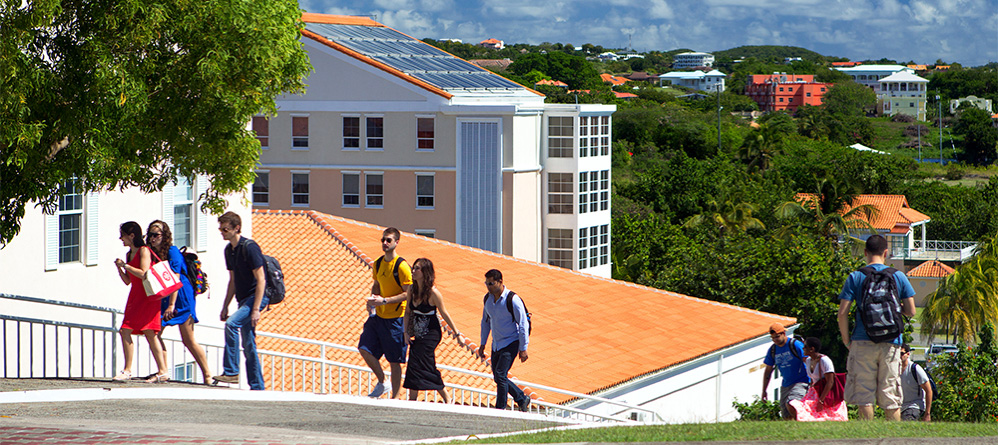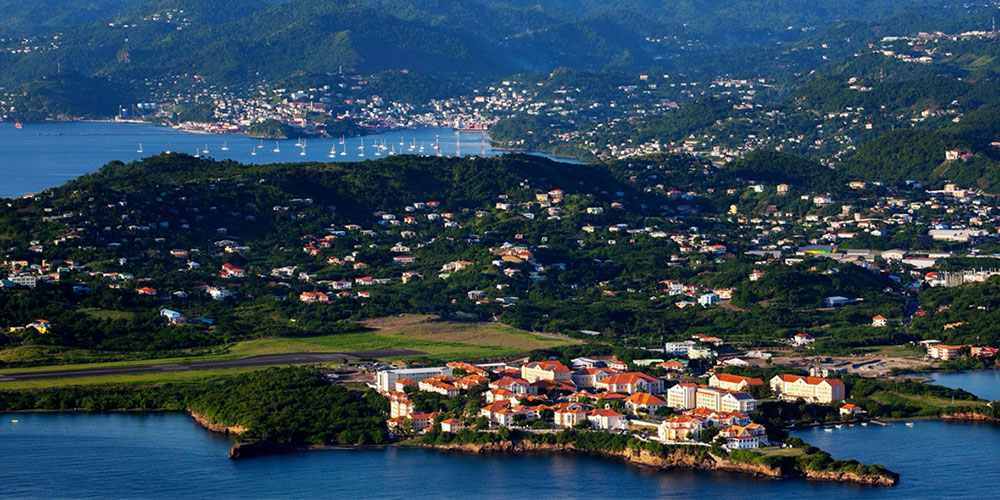There are many benefits that come with attending an international medical school Those who study medicine abroad gain valuable exposure to different healthcare systems, study a wider variety of illnesses, and connect with a more diverse collection of peers in their Doctor of Medicine (MD) programs.
It’s definitely an experience unlike that of traditional med schools in the US or Canada. The location and culture of a like St. George’s University (SGU), located on the island of Grenada in the Caribbean, can raise a series of questions about the school and the experience.
While the medical education offered at accredited international schools meets the same standards as stateside institutions, there are some additional preparations you may need to make as you gear up for your Caribbean med student experience.
7 common questions about attending Caribbean medical school
There are a handful of things all future students should consider when preparing for medical school, such as the importance of maintaining a well-planned schedule and the benefit of preparing early for your licensing exams.
But when you’re preparing to attend a Caribbean medical program, there is a host of other preparations you’ll want to keep in mind. Consider the answers to these common questions:
1. Where will I live?
Specific details regarding housing accommodations can vary depending on the school you attend. At SGU, for example, all incoming medical students are required to live on campus during their first year in the MD program.
This pre-planned stability can be incredibly beneficial as you slowly grow accustomed to life in a foreign country. Not only are you able to avoid any potential stress related to apartment hunting, but you also have the opportunity to fully immerse yourself in the SGU community and forge bonds with your fellow med students.
After completing their first year in the SGU MD program, students do have the option to seek out their own off-campus living arrangements.

2. How will I get around?
The island of Grenada, like many Caribbean islands, is relatively small. That being said, students are encouraged to spend time off campus to experience what the country has to offer. And even menial tasks like grocery shopping will require you to get from point A to point B.
SGU Director of Admissions Jeffery Bates points out that there is a fleet of buses that run from 7am through 2am, which many students frequently use. In some cases, students may opt to purchase a used vehicle for their time on the island, often buying from outgoing students who are headed to their clinical rotations.
Those who choose to do so must acquire a Grenadian driver’s license before they can legally hit the road on their own. The process is fairly simple — you’ll just need to present your US license at the local police station and pay a fee. You’ll receive a temporary license that you’ll need to renew every three months.
3. What will I do about money?
Grenada’s official currency is the East Caribbean dollar, which is pegged to US currency at a fixed rate of $2.70 per US dollar. SGU offers an on-campus ATM that allows students to withdraw money from international accounts.
Do keep in mind, however, that there are fees associated with ATM usage. Some students mitigate this by withdrawing large sums of money at a time, and others opt to open a local bank account for the duration of their time on the island. Credit cards are also widely accepted.
It can be helpful to note that some items may cost a bit more than you might expect on your shopping trips, as the majority of goods consumed on the island have to be imported. You’ll want to budget carefully with this in mind.
You may even consider offsetting some of the costs by shopping for locally grown spices and produce, which tend to be more affordable. St. George’s Square Market can be a great place to purchase locally sourced goods. It is open daily, with Saturday mornings typically being the busiest time to shop.
4. What is the food like?
When shopping for your own groceries, you’ll be able to prepare whatever you want, so picky eaters shouldn’t be wary. But many students make a point to try the native cuisine while living on the island. Grenada’s culinary roots include a mix of African, Arawak, Indian, and British influences.
It is known as Spice Island, due in part to its status as a major exporter of nutmeg. One of the most prominent recommendations you’ll receive when it comes to trying Grenadian foods is nutmeg ice cream. But you’ll also come across a range of fiery stews, fresh seafood, and an array of traditional dessert options, such as sweet potato pudding and Grenadian fudge.
Grenada’s national dish is called “oil down” — it’s an iconic one-pot stew that is packed full of flavor with salted meat, chicken or fish, dumplings, coconut milk, turmeric, plantain, and breadfruit.
5. What should I know about the culture?
The culture of Grenada is heavily influenced by French, English, Spanish, African, and Native American Indian cultures. This rich mixture makes it a fantastic place to visit and learn about.
English is the country’s official language, but the main spoken language among natives is either Grenadian Creole English or, much less common, Grenadian Creole French (also referred to as “Patois”). The island is known for its slow, laid-back atmosphere — something that can take some getting used to for students who are accustomed to the hustle and bustle of life in North America.
There are also strong traditions of dance and drum, which are on full display in the country’s annual carnival. Grenada’s Carnival, also called Spicemas, is one of the most anticipated events on the island. It occurs in August each year, and festivities include music, dancing, and native costumes.
6. What will the weather be like?
Grenada is every bit the tropical paradise that you’re likely expecting. Year-round highs average right around 80 degrees Fahrenheit. The rainy season occurs from May through November, with average precipitation ranging between seven and eight inches monthly.
It can be reassuring to know that Grenada is located below the hurricane belt, outside of the path most hurricanes travel through the Caribbean. When preparing for your time in the Caribbean, it’s smart to pack for warm weather, with the addition of a hat and umbrella to block the sun and rain. Many students also find a raincoat to be useful during their time on the island.
7. What can I do in my spare time?
Your core focus as a medical student will certainly be on your studies. But part of prioritizing self-care in med school is taking time for yourself, doing things you enjoy outside of rigorous coursework. And there are plenty of exciting things to do in Grenada during your down time.
Located about 200 miles northeast of Venezuela, the island is populated with magnificent rainforests, mountains, and beaches. Students often seek out exhilarating opportunities to go snorkeling, kayaking, sailing, scuba diving, hiking, and more. You can even go island hopping, traveling by ferry to visit the neighboring islands of Petite Martinique and Carriacou.
You’ll come across a multitude of opportunities to enjoy the native cuisine with food tours and embrace the culture by visiting local markets and shops. Live music is also common in Grenada — particularly calypso and reggae.
Prepare for your med school adventure with confidence
Now that you’ve reviewed the answers to some of your most burning questions about preparing for medical school in the Caribbean, you can focus more on getting ready to tackle the rigorous expectations of an MD program.
The upcoming transition may feel monumental, and the journey will undoubtedly be a challenging one, but the personal success and community impact you can achieve as a physician will be worth it in the long run.
But you don’t have to take our word for it. Get firsthand insight from grads in our article “SGU Alumni Reminisce About Their Fondest Medical School Memories”.



